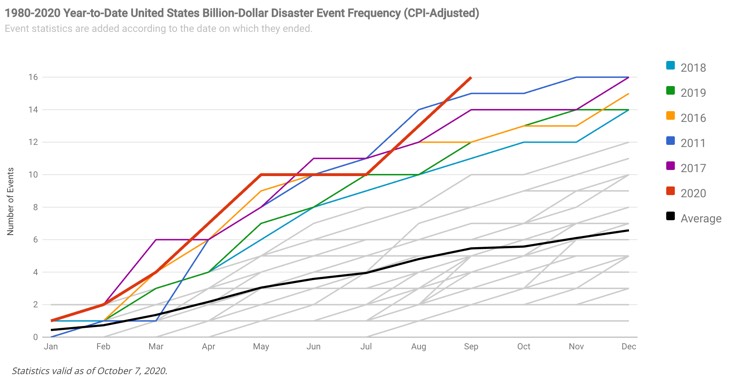Backpack Trolley Handle,School Bag Trolley Handle,Luggage Parts Backpack,Telescopic Handle With Wheels GUANGDONG SUNDES LUGGAGE ACCESSORY TECHNOLOGIES CO.,LTD , https://www.sundes-global.com
NOAA: 2020 already has a record number of $1 billion disasters, and it’s not over
As if you needed yet another reason to keep a go-bag ready at all times, a new report from NOAA reveals that 2020 has already surpassed the previous record of 16 billion-dollar weather and climate disasters—just three months into the year. With a full quarter still left to go, it's clear we're in for an unprecedentedly challenging year.
According to the report, as of October 7, 2020, there have been 16 weather or climate events in the U.S. that caused over $1 billion in damages. This matches the record set in 2011 and 2017, and it’s the sixth consecutive year (since 2015) with at least 10 such disasters. Over the past 41 years, only a handful of years have seen 10 or more billion-dollar disasters, including 1998, 2008, 2011–2012, and now 2015–2020.
What’s even more alarming is that not only are these disasters increasing in number, but their intensity and frequency are also rising. The chart below highlights just how severe 2020 has been compared to previous years, with a significant jump in major disasters across various types.

This report doesn’t even include Hurricane Delta, which is set to break two records on its own. It became the earliest 25th named storm in history, and when it makes landfall, it will mark the first time in recorded history that ten named storms have hit the U.S. in a single season.
Looking at the map associated with this report, I found myself asking several preparedness-related questions. For instance, James Wesley Rawles’ idea of the American Redoubt—covering Montana and surrounding areas—seems more relevant than ever. Could this region’s relative immunity to major climate disasters be one reason behind the booming real estate market in places like Bozeman, where homes are getting six bids and vacancy rates hover near zero?
Another pressing question is how insurance companies will handle the growing financial burden. I’m from the Louisiana Gulf Coast, and I’ve seen firsthand how home insurance premiums are skyrocketing. Many people in my network have been priced out of coverage entirely, despite the constant threat of hurricanes. In regions that continue to face repeated disasters, how long can people afford to keep insuring their homes?
If insurance becomes too costly, does it make more sense to rent instead of buy? And what happens to the entire mortgage-based financial system, which underpins so many investment products? These are real concerns that could reshape the way people think about housing and finance in the coming years.
What do you think? How are these climate trends affecting your life plans? What steps are you taking to prepare for a future that seems increasingly uncertain?